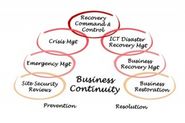-
About
- About Listly
- Community & Support
- Howto
- Chrome Extension
- Bookmarklet
- WordPress Plugin
- Listly Premium
- Privacy
- Terms
- DMCA Copyright
- © 2010-2025 Boomy Labs


 Ken Simpson
Ken Simpson
Listly by Ken Simpson
This Flashblog will launch at 10:00 GMT on 17 March.
The subject is Why testing and exercising are essential for an effective business continuity programme.
PLEASE JOIN IN - you can vote for articles you have read and rate the contributions.
YOU, THE AUDIENCE DETERMINE THE LIST ORDER!
I know I speak for all the authors when I say that any and all comments are appreciated - either here or on the original post/platform.
Remember, if this subject is not worth us engaging with one another - then it is probably not worth our Executives engaging with it either.
Every second article I have read says it's not about the scenario but the actions therein. True, but what happens when you are trying to engage a whole department into Business Continuity Planning, finally get there and get meetings agreed to exercise the plans and the scenarios just don't relate?

a contribution from www.risklogic.com.au
We believe the final stage of the 6 professional practices, Validation, is just as important as stage 1. Learning through confirmation is an excellent way to embed and develop the Business Continuity Plan (BCP) ...

by Harriet Wood
Harriet Wood took on responsibility for business continuity at Marston’s Plc in 2007. Marston’s are the leading brewer of premium cask and bottled beers in the UK. They also have an estate of over 1700 pubs. Harriet is based at their Head Office in Wolverhampton but travels around their five breweries and eight distribution sites looking after business continuity.

by David Window MBCI/MCIPS/CIRM
Director Continuity Shop and Continuity 22301 Ltd

Business Continutity Plans are often created in the spirit of compliance and obligation, rather than a desire for real organisational readiness. They sit in the filing cabinet gathering dust along with the insurance policy and that warranty for the printer your company bought back in 2007.

Why? Because the exercise is a tipping point. A tipping point is defined as: "noun: tipping point; the point at which a series of small changes or incidents becomes significant enough to cause a larger, more important change". Done well a great exercise will drive your Business Continuity or Disaster recovery programme long after the exercise is complete.

It hones the skills, improves decision-making and allows us to develop new skills whilst testing our abilities. And what else? Well surprisingly the more we do it the better we perform. So why is business so slow to embrace it? What am I talking about?
By Paul Robertson What a waste of time! Why bother exercising? Seriously? It takes valuable time away from doing the revenue-earning task that your business relies on. Without that income, what's the point anyway right? It's a distraction from the importance of getting the job done. And in today's ever-pressured...
by Clare France, AMBCI
Before I began working for the Fire and Rescue Service I knew little about business continuity (BC), however, overtime I have learnt the importance of adopting BC within an organisation and crucially how vital it is that BC arrangements are tested and exercised regularly.

Curator's Note :
Technically this post was not published in the Flashblog, but it addresses the BCAW theme and offers some useful perspectives for BC practitioners to reflect on.


Geary Sikich is a principal with Logical Management Systems, Corp., a consulting and executive education firm with a focus on enterprise risk management and issues analysis. www.logicalmanagement.com

by Lyndon Bird, FBCI
Lyndon Bird FBCI is an independent commentator, educator and consultant in all matters of business continuity and organizational resilience.

'US air traffic control system a hacking risk' 'Europol sweep disrupts hackers hijacking millions of PCs' 'Disruption for cybercrooks that infected millions of PC's' 'Half of New Zealand businesses not ready for a cyber attack' 'Cyber-crime's new front: Your reputation' ..........some of the headlines over the last few weeks.

As we mentioned yesterday, this week is Business Continuity Awareness Week. This post is one of many being published by business continuity/disaster recovery professionals around the world as a part of Business Continuity Awareness Week's Flash Blog.

More on why companies need to look beyond tape backups for really effective IT disaster recovery as part of our Business Continuity Awareness Week blog series. Last time, we argued that tape backups had been superseded by newer, more reliable technologies; and that companies should be investigating the range of vendors of virtualisation technologies to get the best deal.
From ContinuitySA

Markus Jähi is currently working as a research scientist at VTT Technical Research Centre of Finland, which is the largest applied research organization in the northern Europe. Since 2010 he has participated in several European and national research and development projects in the field of risk management, security studies and service business development. Currently he works as a work package leader in a large European research and development project CRISMA. Before VTT, Jähi has worked with trade policy and foreign trade. Jähi has a master’s degree on Industrial management and engineering from Tampere University of Technology, and another master’s degree on Political science from University of Turku.

Since the publication of the Disaster Recovery Preparedness Benchmark Survey of 2014, we've been sharing the report as often as possible...'ringing' the bell on preparedness and where we can help companies improve their readiness.

You are here: Home / Posts / BCM / Testing Business Continuity Plans - It's not an Option Search Our Blogs My wife decided we needed a bench just inside our front door. She went to various shops and found one - for $400. Being a relatively handy guy, I thought I'd build my own.
